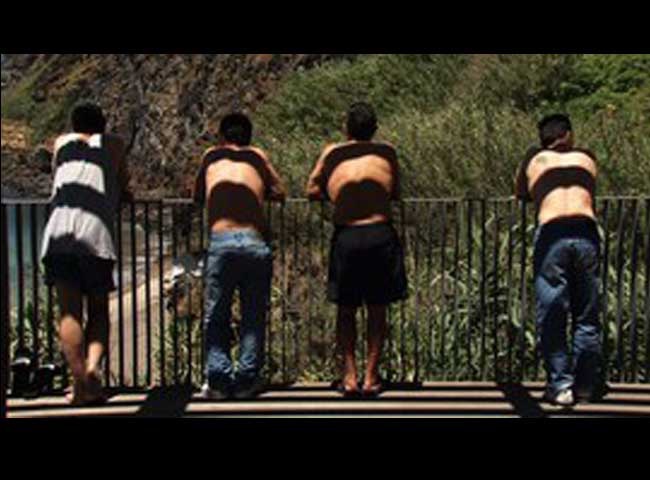Deportado
-
Réalisé par Nathalie Mansoux • Écrit par Nathalie Mansoux
-
France, Portugal • 2012 • 67 minutes • HDCam • Couleur
- Réalisation :
Nathalie Mansoux - Écriture :
Nathalie Mansoux - Image :
João Pedro Placido - Son :
Miguel Moraes Cabral - Montage :
Justine Lemahieu
- Production (structure) :
Terratreme Filmes - Coproduction :
Les Films Grain De Sable, Raiva - Participation :
CNC, Direççao regional das communidades, Fondation Calouste Gulbenkian - Fundação Calouste Gulbenkian – Centro Português de Cinema, Programme MEDIA, RTP 2 - Ayant droit :
Terratreme Filmes
- N° ISAN :
non renseigné
Résumé
"Comment s’enraciner au pays de ses racines ? Le paradoxe n’est qu’apparent pour les expulsés d’Amérique qui, résidents aux États-Unis où ils vivent parfois depuis l’âge tendre, retrouvent soudain la terre de leurs ancêtres açoriens pour cause de "double peine". "Deportado" explore les conséquences d’un changement législatif de 1996 qui autorise l’expulsion automatique des détenus, guère informés au moment où le parquet les encourage à plaider coupable. Jamais pourtant Nathalie Mansoux n’emprunte la voie du documentaire argumentatif. La force de son film tient dans le contraste sidérant entre les paysages ouverts, presque paradisiaques, de l’archipel portugais et l’absence d’horizon vital à laquelle les ex-détenus sont confrontés. Guide touristique, "atelier énergie" et antidépresseurs à gogo au foyer, tout semble programmé pour faire oublier les barreaux invisibles. Mais la vacuité que restituent les cadrages et le montage, les moments de suspension temporelle qui disent le désœuvrement psychique, rendent au ras des sens l’archaïsme de cette expulsion. Privés de leur réseau familial qui subsistait lorsqu’ils étaient en prison, les Luso-américains de Deportado rappellent douloureusement les bannis de la Grèce antique."
(Charlotte Garson - Cinéma du réel)
"How can you put down roots in the land of your roots? This seemingly paradoxical question applies to the expelled from the United States, where they have lived as American residents sometimes from their early childhood, and who suddenly rediscover the land of their Azorean ancestors due to “double penalty”. Deportado explores the consequences of a 1996 change in US law that authorises the automatic expulsion of prisoners, even though they are hardly informed of this when the prosecution encourages them to plead guilty. Yet, Nathalie Mansoux never goes down the path of the argumentative documentary. The force of her film lies in the staggering contrast between the open, almost idyllic landscapes of the Portuguese archipelago and the absence of a horizon offering the former detainees a future. A tourist guide, “energy workshop” and antidepressants galore at home, everything seems programmed to make them forget the invisible bars. But the emptiness recreated by the framing and editing along with the moments of suspended time that intimate their mental indolence gives us an acutely physical sense of the archaic nature of this expulsion. Deprived of the family network that was present when they were in prison, Deportado’s Luso-Americans are painfully reminiscent of the outcasts of Ancient Greece."
(Charlotte Garson - Cinéma du réel)
Mot(s)-clé(s) thématique(s)
Sélections et distinctions
- 2014 • Festival 2 Cinéma de Valenciennes • Valenciennes (France) • Compétition documentaire
- 2013 • Cinéma du réel • Paris (France) • Compétition Internationale


